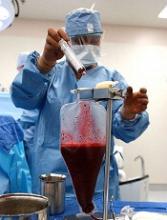A case report suggests an investigational chimeric antigen receptor (CAR) T-cell therapy can provide a bridge to transplant in relapsed/refractory acute myeloid leukemia (AML).
The therapy, known as CYAD-01, prompted a morphologic leukemia-free state in an AML patient.
This patient went on to receive an allogeneic hematopoietic stem cell transplant (allo-HSCT) and achieve a complete molecular remission, which was ongoing 6 months after transplant.
Investigators reported no adverse events related to CYAD-01.
This report was published in haematologica.
The patient is enrolled in the THINK trial (NCT03018405), which is sponsored by Celyad SA, the company developing CYAD-01.
According to Celyad, CYAD-01 consists of autologous T cells expressing a CAR based on the natural killer group 2 member D receptor (NKG2D), a transmembrane receptor expressed by natural killer cells and some T-cell subsets.
The AML patient who received CYAD-01 was 52 years old at trial enrollment. He had +8/del(7)(q22q36), FLT3/NPM1 wild-type AML.
The patient’s disease was primary refractory to 7+3 induction, so he went on to receive salvage chemotherapy with cladribine, cytarabine, G-CSF, and mitoxantrone. He achieved a complete response to this treatment and received 2 cycles of consolidation with cladribine and cytarabine.
The patient’s subsequent allo-HSCT was delayed to allow for pulmonary function test recovery. In the meantime, he relapsed.
At this point, the patient enrolled in the THINK trial. He underwent apheresis and received CYAD-01 infusions at the initial dose level of 3 x 108 cells every 2 weeks for 3 administrations.
The patient achieved a morphologic leukemia-free state at 3 months, which enabled him to undergo allo-HSCT.
The patient achieved a complete molecular remission after transplant. He remained in remission at last follow-up—9 months after his first CYAD-01 infusion and 6 months after allo-HSCT.
The investigators said CYAD-01 was well tolerated in this patient. He did not develop cytokine release syndrome or experience neurotoxic effects. The patient had only non-related grade 1 adverse events.
“The THINK study case report provides the first clinical validity of CYAD-01 as a tumor-specific antigen-receptor and AML as a disease sensitive to gene-engineered cell therapies,” said study investigator David Sallman, MD, of Moffitt Cancer Center in Tampa, Florida.
“As antigen targeting offers significant challenges in AML, this outcome brings hope for the further use of gene-engineered T cells for patients with AML [who] have run out of therapeutic options. It’s all the more striking that this outcome was observed without any prior lymphodepletion, highlighting the potential of using a physiologic antigen-receptor.”


